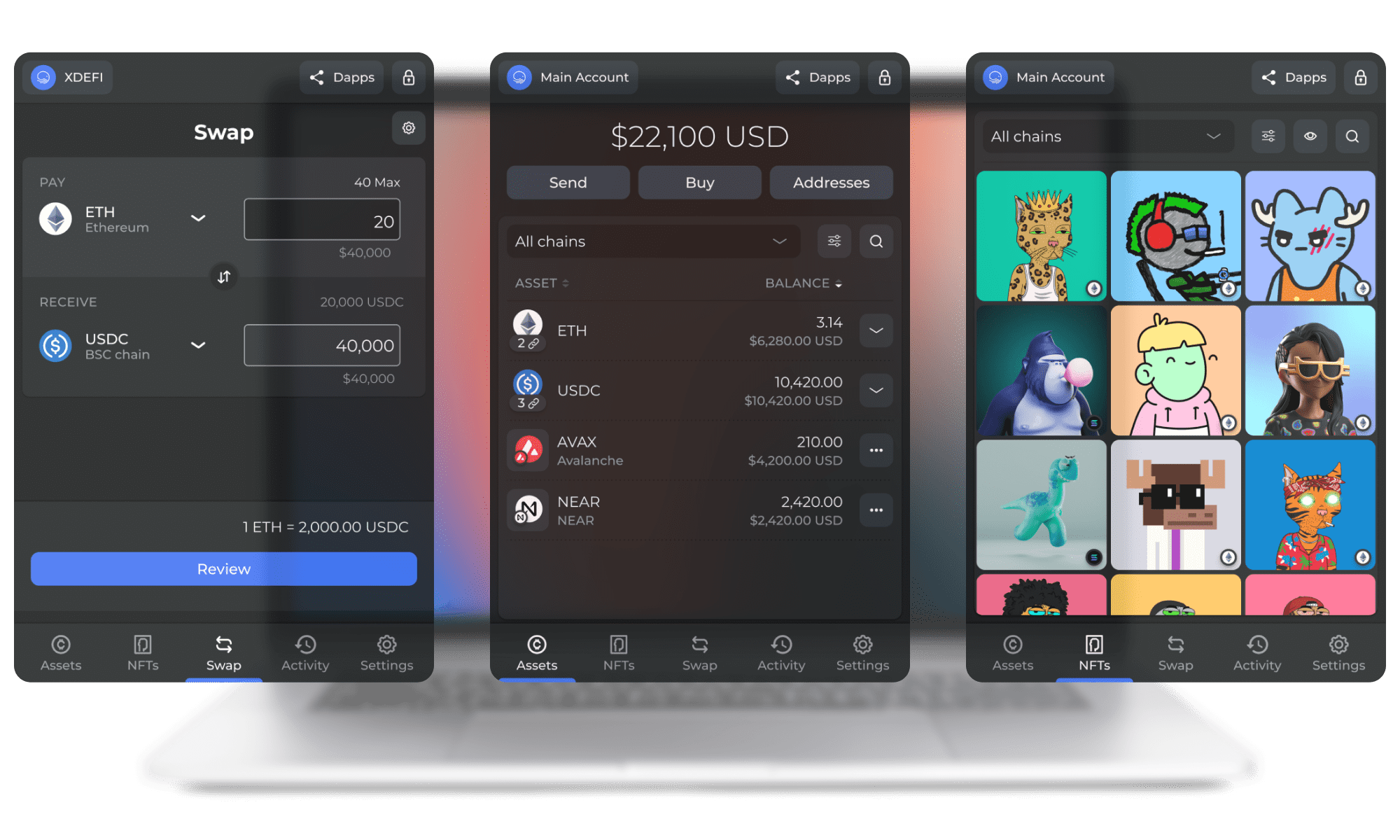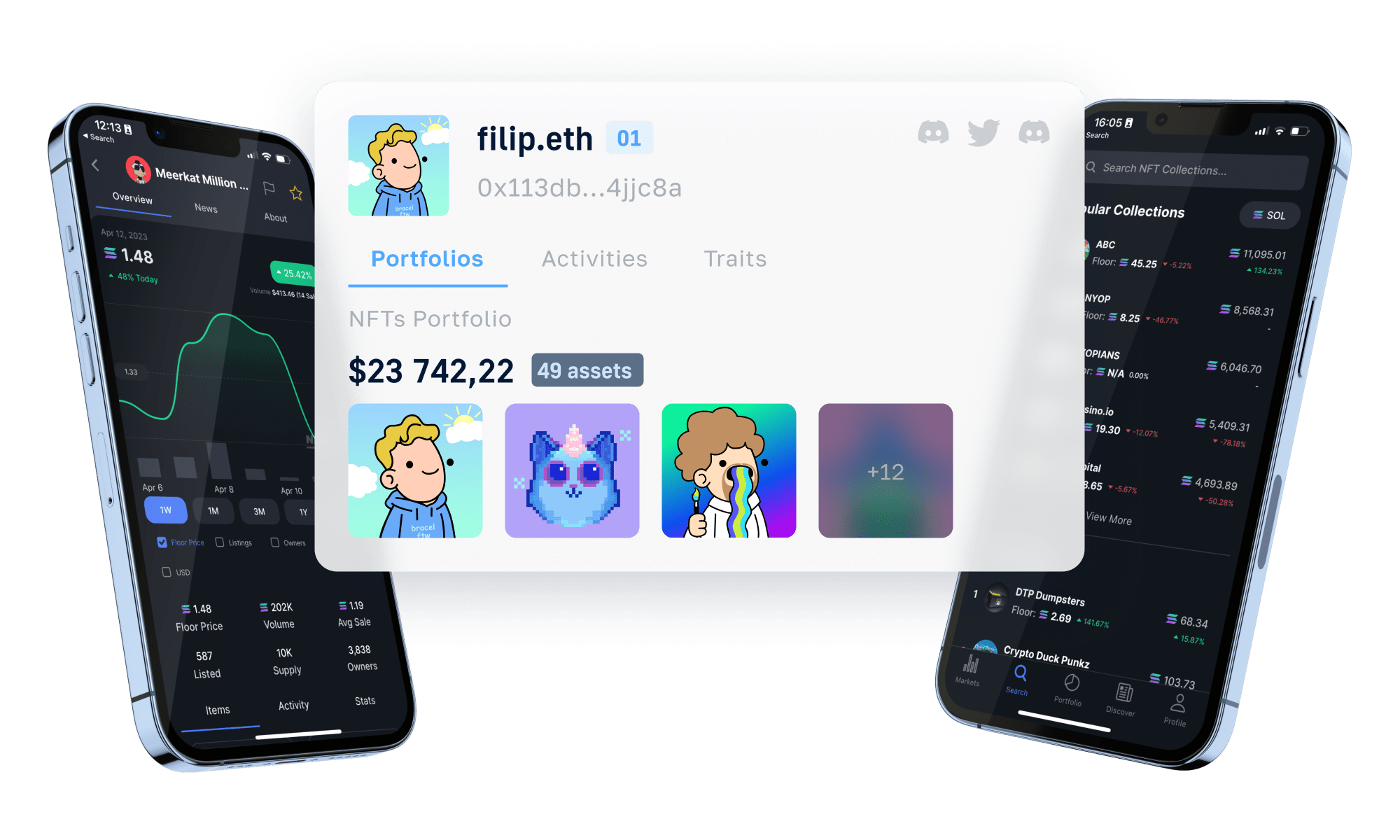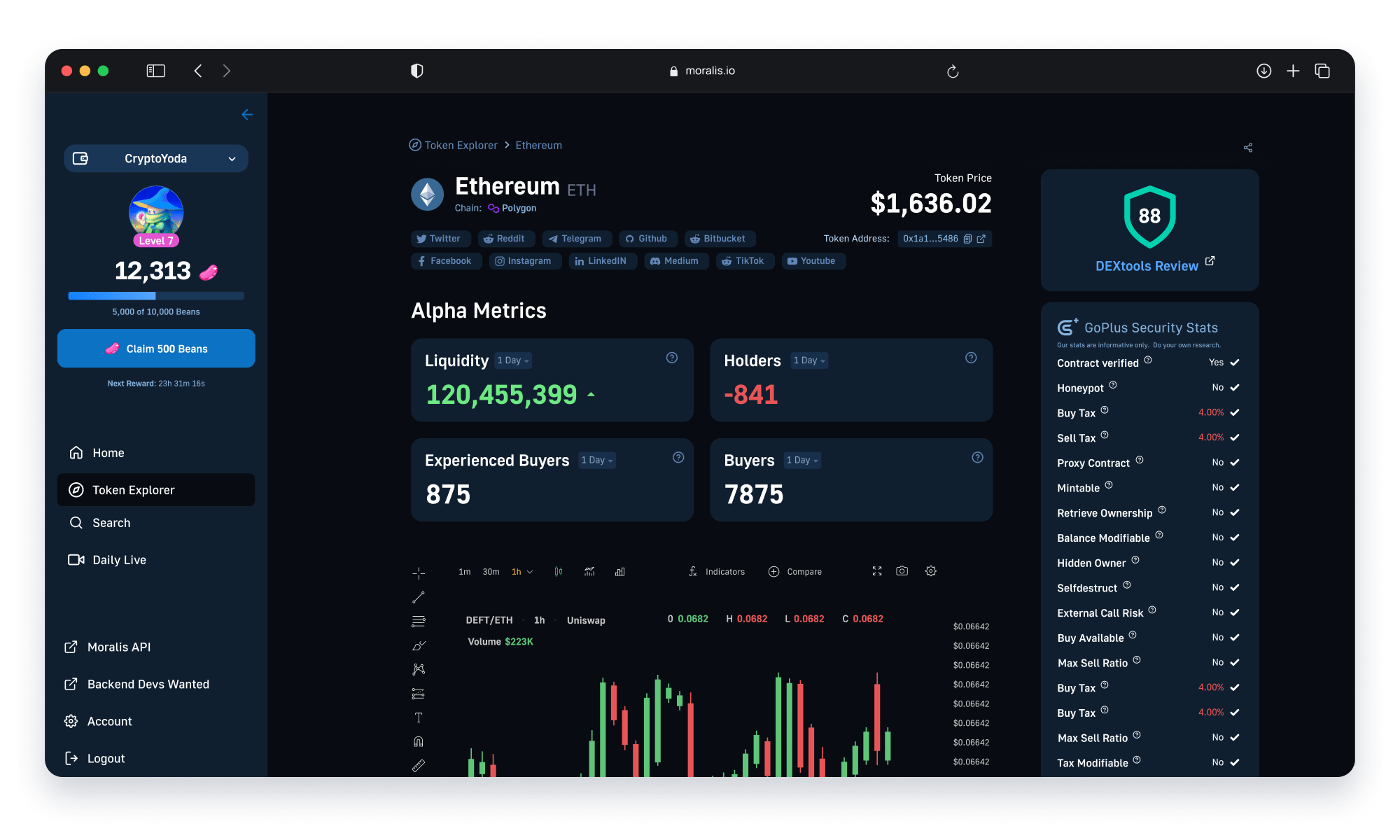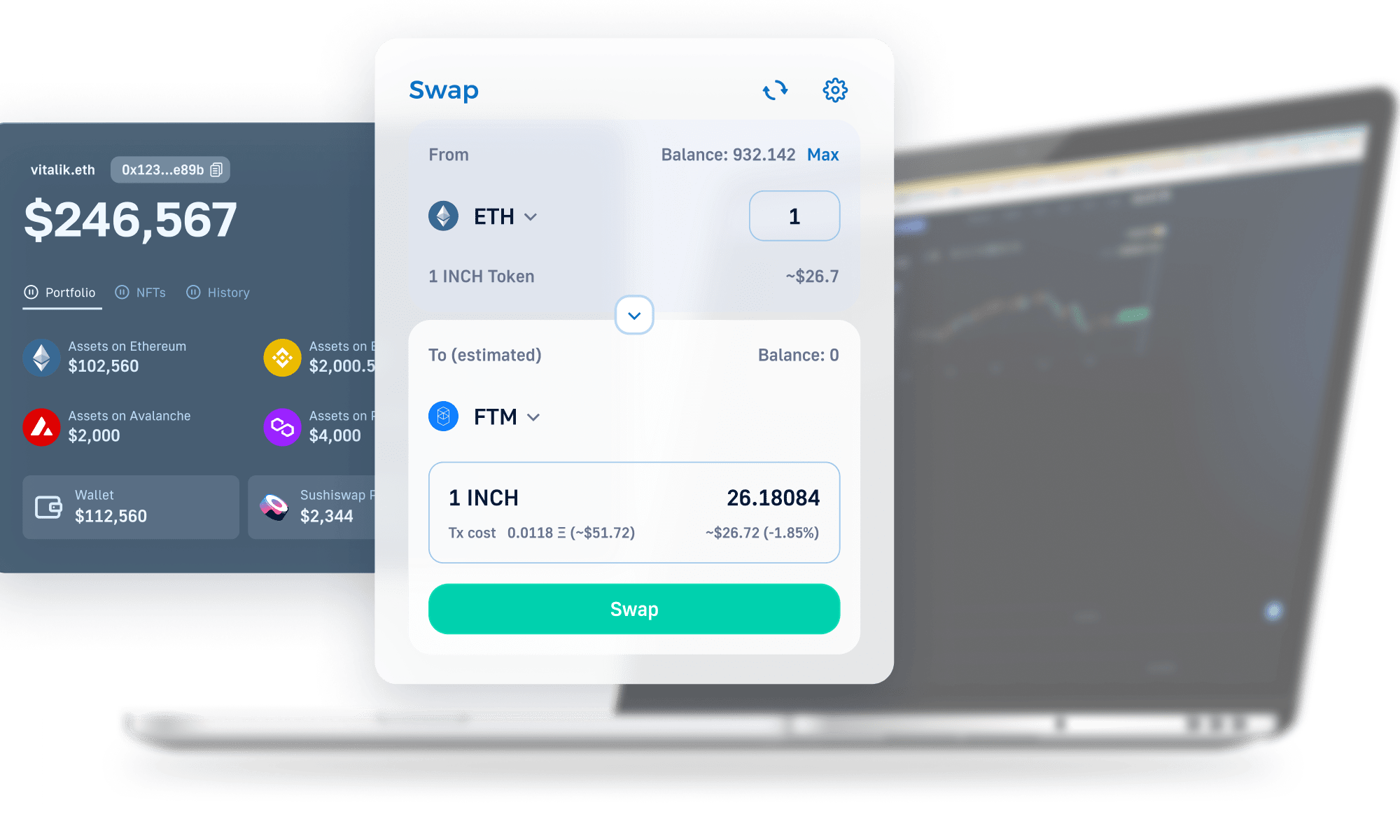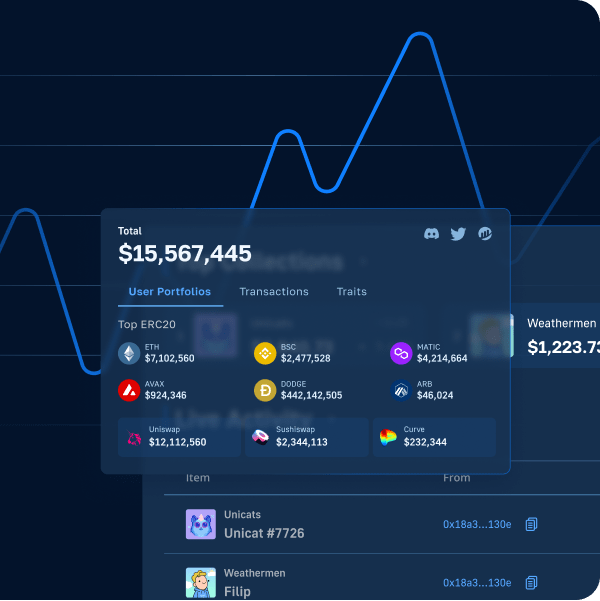A crypto market data API provides essential market data for investors and traders. For developers, using a robust, reliable, and fast API for market data is imperative. What’s more, it should be easy to use. In turn, with such an API, devs can focus on creating the best user experience and avoid worrying about parsing on-chain data. But out of all market data APIs for crypto, which is the best one? Follow along as we explore the best crypto market data API from Moralis and how to use it to get crypto trading data!
Best Crypto Market Data API For All Types of Dapps
Overview
We will start today’s article by covering the basics. This is where you’ll learn what a crypto market data API is and why it is useful. Along the way, we’ll also cover what crypto market data is and what an API is. After all, to understand the gist of a crypto market data API, you need to be familiar with these two subjects.
However, in case you are already all caught up with the basics, you’ll probably want to start by taking a closer look at some popular use cases for crypto market data APIs. Or, you might be ready to start using the best crypto market data API immediately. If so, you can skip the initial sections and dive straight into the “how to” part of today’s article. Furthermore, in that actionable part of today’s article, you’ll get acquainted with Moralis and its powerful APIs. Of course, the Market Data API will be our main focus. However, to further empower you, we’ll also glance at other popular Moralis APIs.
Lastly, we’ll also tell you about an awesome dapp where you can see and experience the power of Moralis’ crypto Market Data API firsthand.
What is a Crypto Market Data API?
As promised in the overview, we want to make sure you know what a crypto market data API is. To achieve that, let’s quickly refresh our memory of what APIs are and what crypto market data entails. With a proper understanding of these two subjects, we’ll just need to put it all together to wrap up this section.

What is an API?
An API, or application programming interface, is like a language translator for computer programs. From a certain perspective, you can think of API as you would of a restaurant menu. After all, it provides a set of rules and tools that enable different software components to communicate effectively. That’s much like a restaurant menu (or a waiter) that allows restaurant customers to communicate with the kitchen staff.

You can also imagine having a weather app on your phone. When you open the app, it displays the current weather for your location. However, this app doesn’t generate weather data on its own. Instead, it sends a specific request to a weather service’s API, just like ordering from a menu. This API processes the request and returns the weather data in a format the app can understand, similar to how a chef prepares your meal according to the menu’s description. This way, the app doesn’t need to worry about the complexities of collecting or processing weather data; it relies on the API to handle these tasks.
In essence, an API acts as an intermediary, simplifying communication between different software components. It streamlines interaction, saving developers time and effort while ensuring that various programs can cooperate seamlessly and efficiently.

API in Web3
While the API originated in Web2 development, this type of tool also found its way to Web3 programming. In fact, it is so powerful that with a reliable set of Web3 APIs, dapp developers can reduce their dev time by more than 80%. After all, in Web3, APIs cover all the repetitive stuff and enable devs to avoid reinventing the wheel.
What is Crypto Market Data?
Most individuals have at least heard of Bitcoin, and so they think this leading cryptocurrency represents the majority of the crypto market. However, in reality, an entire ocean of data circulates on other blockchain networks. In fact, due to its first-mover advantage and programmable nature, Ethereum is where the most interesting crypto market data resides. Moreover, crypto market data is akin to a dynamic scoreboard for the world of cryptocurrencies. It serves as a continuously updating stream of information, not unlike a digital stock ticker, providing insights into the happenings within the realm of digital currencies.

At its core, crypto market data includes the pricing details of various cryptocurrencies like Bitcoin, Ethereum, and other assets. However, it goes beyond prices; it represents a valuable repository of knowledge. Not only does this data showcase current prices but also buying and selling activities. Trading volumes are another crucial facet revealed by crypto market data, indicating the level of activity and liquidity for a specific cryptocurrency.
Crypto market data also offers historical price trends, equipping traders and investors with valuable information to make calculated decisions. It provides insights into market capitalization, which denotes the total value of all circulating coins. This metric helps gauge the relative significance and scale of each cryptocurrency in the broader landscape.
Plus, the realm of crypto market data further expands when we also consider NFTs (non-fungible tokens). After all, these unique crypto assets are also trading regularly on marketplaces.

Tying it All Together: Crypto Market Data + API
A crypto market data API serves as the essential bridge between the complex world of cryptocurrency market information and the applications or systems that need to access and utilize this data. It’s like a seamless connection that allows software, trading platforms, or websites to tap into the constantly changing data within the cryptocurrency market.
Much like an API in general, a crypto market data API defines the rules and tools that enable different software components to communicate effectively. In this context, it facilitates the retrieval of real-time pricing, trading volume, historical trends, and other critical data related to various cryptocurrencies.
In addition, a more advanced crypto market data API can even provide specific details based on the above-mentioned data. For instance, such an advanced API could offer a list of trending NFTs and ERC-20 tokens.

Use Cases for a Crypto Market Data API
The use cases for a crypto market data API are both diverse and compelling. Let’s look at some of them below:
- Trading Platforms: Crypto market data APIs are the lifeblood of cryptocurrency exchanges and trading platforms. They facilitate real-time updates on cryptocurrency prices, order book information, and seamless trade execution, ensuring traders have the most accurate data to inform their decisions.
- Portfolio Management: Investors rely on these APIs to monitor and manage their cryptocurrency holdings. Portfolio management tools leverage market data APIs to offer users up-to-the-minute asset valuations and performance metrics.
- Financial News Websites: Cryptocurrency news and analysis websites utilize these APIs to furnish their readers with timely market data. This ensures that their content remains current and trustworthy.
- Cryptocurrency Wallets: Wallet applications employ market data APIs to display users’ cryptocurrency holdings’ current values, aiding users in making well-informed choices regarding their digital assets.
- Arbitrage Trading: Traders leverage market data APIs to spot price disparities across different exchanges. This empowers them to capitalize on arbitrage opportunities by buying low on one exchange and selling high on another.
- Algorithmic Trading: Developers create trading algorithms that execute buy and sell orders based on predefined criteria. Market data APIs furnish these algorithms with the necessary data to make rapid trading decisions.
- Research and Analysis: Researchers and analysts utilize crypto market data APIs to gather historical data, perform in-depth trend analysis, and generate data-driven reports and insights.
- Risk Management: Effective risk assessment and hedging strategies depend heavily on accurate market data. These types of APIs enable risk managers to monitor the market in real-time and adjust their strategies accordingly.
- Cryptocurrency ATMs: Crypto ATMs rely on market data APIs to determine exchange rates when users buy or sell cryptocurrencies, ensuring fair and up-to-date pricing.
How to Get Going with the Best Crypto Market Data API
Given the wide range of use cases for a crypto market data API, you can imagine that there are various API providers to choose from. So, it’s important to know your needs and pick the right provider.
In case you are building dapps (decentralized applications), there’s simply no better option than the Moralis API fleet. And part of that fleet is also the Market Data API. Unlike several other Moralis APIs that you can use to obtain real-time crypto market data, the Market Data API has some extremely advanced and specific use cases.
After all, this API is all about the ultimate shortcuts, and it allows you to do the following with just a short snippet of code:
- Fetch ERC-20 tokens by market cap. The “getTopERC20TokensByMarketCap” endpoint enables you to get the top ERC-20 tokens by market cap.
- Get the top ERC-20 price movers. The “getTopERC20TokensByPriceMovers” endpoint allows you to fetch ERC-20 tokens based on their price changes.
- Fetch top NFT collections by market cap. The “getTopNFTCollectionsByMarketCap” endpoint enables you to get the top NFT collection by market cap.
- Get the hottest NFT collections by trading volume. The “getHottestNFTCollectionsByTradingVolume” endpoint allows you to fetch the NFT collection with the largest trading volume.
You can learn more about these powerful endpoints by following the above links to the designated documentation page. On those pages, you can also find the snippets of code that will help you implement these powerful features in seconds.
For instance, if you are using the Node.js framework to fetch the top ERC-20 tokens by market cap, then these are the lines of code that will do the job:
import Moralis from 'moralis';
try {
await Moralis.start({
apiKey: "YOUR_API_KEY"
});
const response = await Moralis.EvmApi.marketData.getTopERC20TokensByMarketCap({});
console.log(response.raw);
} catch (e) {
console.error(e);
}
Get Your Moralis API Key Today
By looking at the above lines of code, you can see that in order to use the powerful shortcuts that Moralis’ crypto Market Data API offers, you need your Moralis API key. To get that key, you just need a free Moralis account, which you can create in seconds.
However, while there are many Moralis APIs that a free account grants access to, this is not the case with Moralis’ Market Data API. After all, this API includes a set of highly advanced endpoints and requires at least a Moralis Pro plan.
So, if you are interested in using the power of the above-outlined endpoints, make sure to upgrade to the Pro plan today. Either way, you will want to get your API key. Fortunately, once you have your Moralis account ready, you can get going right away:
- Create a new project inside your Moralis dashboard:

- After naming your project, select the “Web3 APIs” option and hit the “Get your API keys” button:

- Once on the “Project Settings” page, simply copy your default Moralis Web3 API key or use the “Create new secret” button to generate a new key:

Going Beyond the Market Data API
As mentioned previously, Moralis’ crypto Market Data API is just one of many Web3 APIs that this ultimate Web3 development platform has to offer. To view Moralis’ entire API fleet, take a closer look at the list below:
- NFT API – This enables you to cover all NFT-related aspects of your next big NFT project. It provides enriched metadata, real-time NFT transfer data, NFT ownership data, and much more.
- Price API – The most complete crypto Price API on the market. It covers all cryptos, from the smallest and newest coins to the largest cryptocurrencies.
- Wallet API – When it comes to integrating wallet functionalities into your Web3 dapps, this API is the definitive solution. It entails an array of features, exceptional flexibility, and unparalleled scalability.
- Token API – This API is the key to accessing real-time token prices, wallet balances, transfers, and liquidity effortlessly.
- Streams API – It allows you to cover real-time notifications and receive instant, customizable updates whenever something important happens on-chain.
- Auth API – Equip your dapps with Web3 authentication with a single line of code.
Other powerful Moralis APIs:
All Moralis APIs offer the invaluable advantage of cross-chain interoperability:

Summary: Crypto Market Data API – Get Crypto Trading Data
In today’s article, we covered quite a lot of ground. First, you had a chance to learn or refresh your knowledge about APIs and crypto market data. Hence, you are now able to confidently answer the question, “What is a crypto market data API?”. In essence, it is all about bridging the gap between cryptocurrency market data and applications or systems.
You also had a chance to learn about the most common use cases for a crypto market data API. So, you now know that this type of API can be used in all sorts of dapps. Some leading applications include trading platforms, portfolio management, financial news websites, cryptocurrency wallets, arbitrage trading, algorithmic trading, research and analysis, risk management, and cryptocurrency ATMs.
Next, we covered the gist of Moralis’ crypto Market Data API and how to get started with it. You now know that this API is the best choice when it comes to fetching ERC-20 tokens by market cap and price change, as well as getting top NFT collections by market cap or trading volume. You also learned how to fetch your Moralis API key, which is the key to using the best crypto market data API.
Last but not least, we offered a full list of Moralis Web3 APIs. Hence, you now know that Moralis is the ultimate tool for building powerful dapps the easy way.
